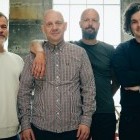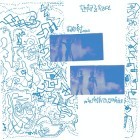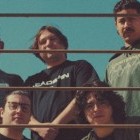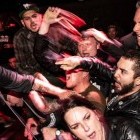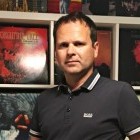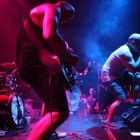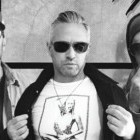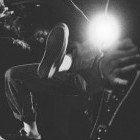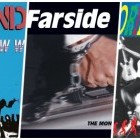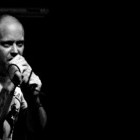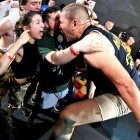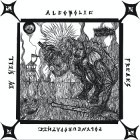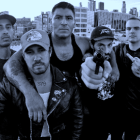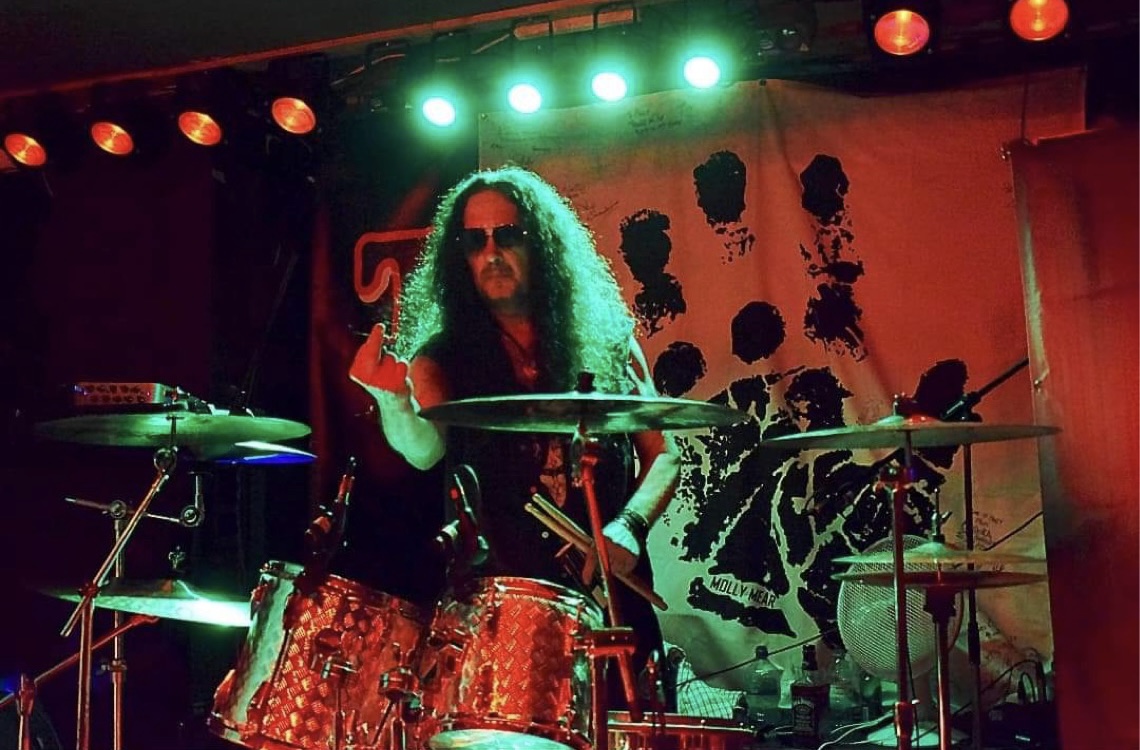
Now, you might be asking yourself some version of the following question, “Abaddon from Venom being interviewed in A Hardcore Conversation? But Venom aren’t hardcore? What gives?”
To that I say two things: in the true sense of the word, what and who has ever been more hardcore than fuckin’ Venom? And back in the day the only two acceptable metal bands in the hardcore scene were Motörhead and, you guessed it, Venom!
This is an epic beast of an interview so sit back, relax and prepare yourself dear reader, A Hardcore Conversation lives on.

*Also, for clarification, and I try to illuminate a couple of times in the beginning: Conrad = Cronos, Jeff = Mantas and Dolan = Demolition Man.
You are Abaddon, drummer for Venom, Venom Inc. and Abaddon, correct?
That's right. Yeah, that's exactly right.
Okay. And you're from Newcastle on Tyne, is that also correct?
That's correct. Yeah. It was kind of a big deal in the '80s to be a metal band in Newcastle because it's where a lot of the newer British heavy metal bands came from, Tygers of Pan Tang, Raven, Fist, Avenger, you know, every time you turned around, there was another band in the studio, it was a very small studio in a place called Wallsend just outside the city of Newcastle and it's like a little kind of a one street, one high street sort of place. One little recording studio above a gaming room, and everything just took off. You know, within a matter of months.
Gotcha. Was there any punk there too, or was it just metal?
There were a few good punk bands and Angelic Upstarts were one of the bands that were around at that time. There were a few but the punk scene was a big London thing. We, specifically Venom, had kind of crossed over the heavy metal sort of Motörhead and, I guess Judas Priest and stuff like that we crossed that over with the punk kind of feeling that was going around at the time.
The big punk thing was kind of the middle of the '70s. So you know, it was ourselves and a band called Warfare who were very similar. And Warfare had a very punky edge to them as well.
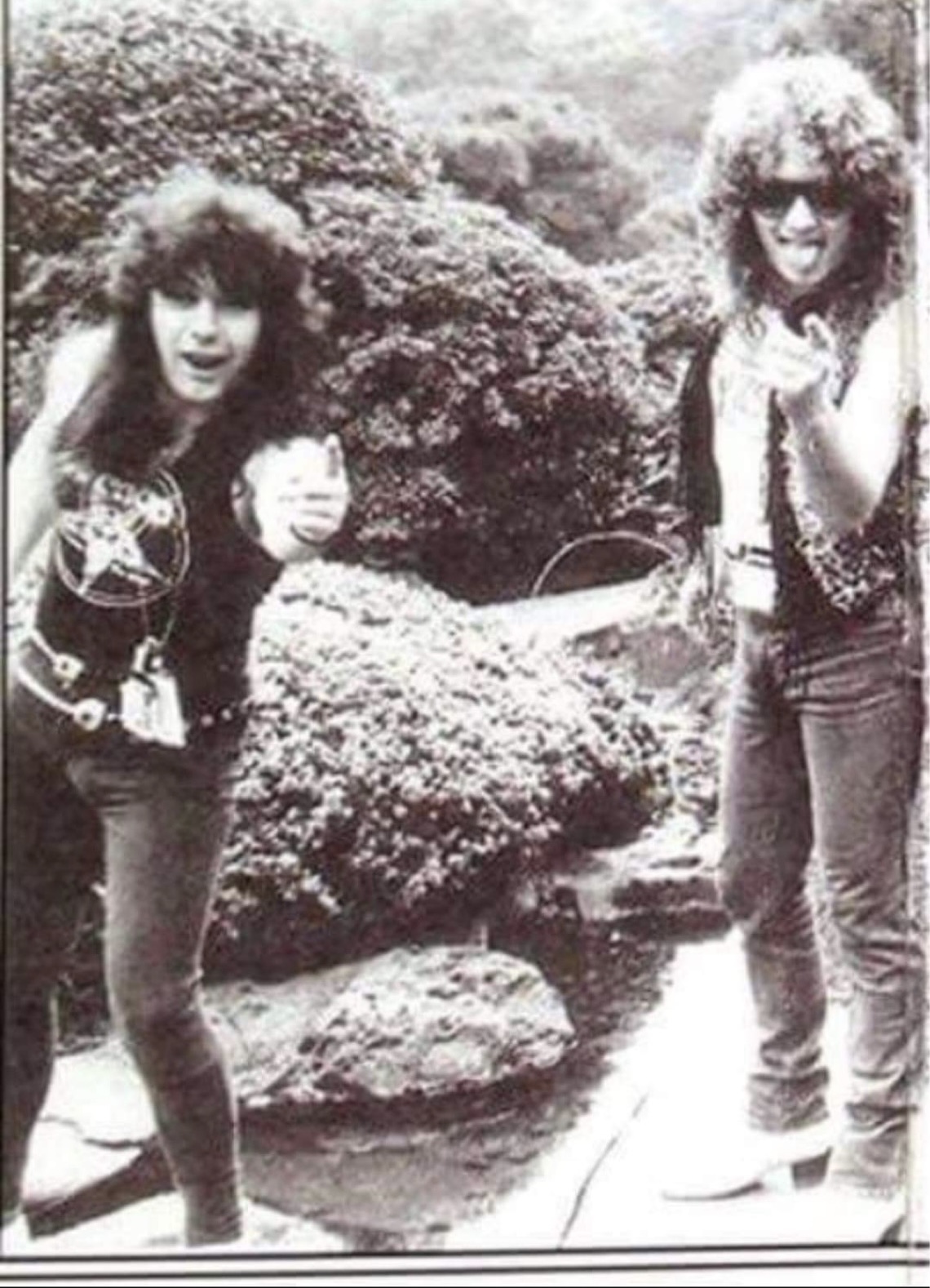
Didn't they have their record produced by Lemmy? Is it that band?
Yeah, the singer Evo still has, he's had a lot of collaborations with with the lads from Motörhead and some of the guys from Thin Lizzy and whatnot. But yeah, the punk thing was kind of a big rush in the '70s. It was a big deal. We were kind of on a wave on the back of that.
Gotcha. Yeah. So what do you think it was about Newcastle? Because I mean, I think supposedly, unless this isn't right, but I also saw that Sting is from there and Neil Tennant from Pet Shop Boys and someone from Dire Straits, a lot of music was coming out of there for some reason.
Yeah, it was a big wealth of stuff. I mean, David Coverdale from Whitesnake wasn't born that far away. As you said Dire Straits all the lads in Dire Straits. I think it's just I mean, the answer I'd like to give is that it's always been a very industrial sort of area. There’s been a lot of coal mines there an awful lot of coal mining and heavy industry with the fishing industry and all these kinds of things that are very hard industries and in the '70s over here there was a big problem with sort of people making enough money to live.
It was quite a tough time to grow up, we kind of grew up watching your own, it was a very heavy place to live. I think a lot of people looked to either football, getting into soccer, or music. And music was the thing for me. But then there was so many people that have been successful and it kept being successful over the area. You know, you had to believe that it was possible to do stuff and you know, you could see it on every street corner really.
I also saw that Newcastle started off as a Roman settlement. Were you aware of the town's kind of rich history and stuff like that when you were growing up?
Yeah, I mean, the place that I described where the studio was was a place called Wallsend, because it was the end of Hadrian's Wall. Emperor Hadrian was a Roman emperor and he and his men got as far as the north of England where we live, then they found the Scots over the border, a bit of a harder nut to crack. So they built the wall which goes from coast to coast, and obviously it ends at Wallsend,
Gotcha, that's pretty cool. Alright, so you kind of already said what inspired you to play drums was kind of like a way to get out of poverty or whatever. Were your parents into music and specifically you playing music, Were they supportive of that?
They weren't into music, but they were very supportive of it. Because I guess they could see that it was a way, I mean, as long as I, I had an apprenticeship in the factory where my dad worked that's where I met the guy who became Venom's first singer, Clive Archer. And I also met Eric Cook who was the band's longtime manager.
We apprenticed together when we were 16 and all we talked about, I mean, everybody there had long hair, and all we talked about was the bands at the time and the main venue here at the time was called the City Hall, which is still there. It fits about two or 3000 people.
So it's still a music venue and everything?
Yeah. You could go there every night and see a metal band. You could go and see Judas Priest one night and then Rush the next. I saw Rush's first ever gigs outside the US. You'd see Thin Lizzy, you'd see UFO, you'd see Deep Purple, you could see Rainbow's first gigs and it was just so inspiring. You know? You kind of meet friends that were all like minded and I was working with friends who were all like minded. And the scene was just huge, absolutely huge.
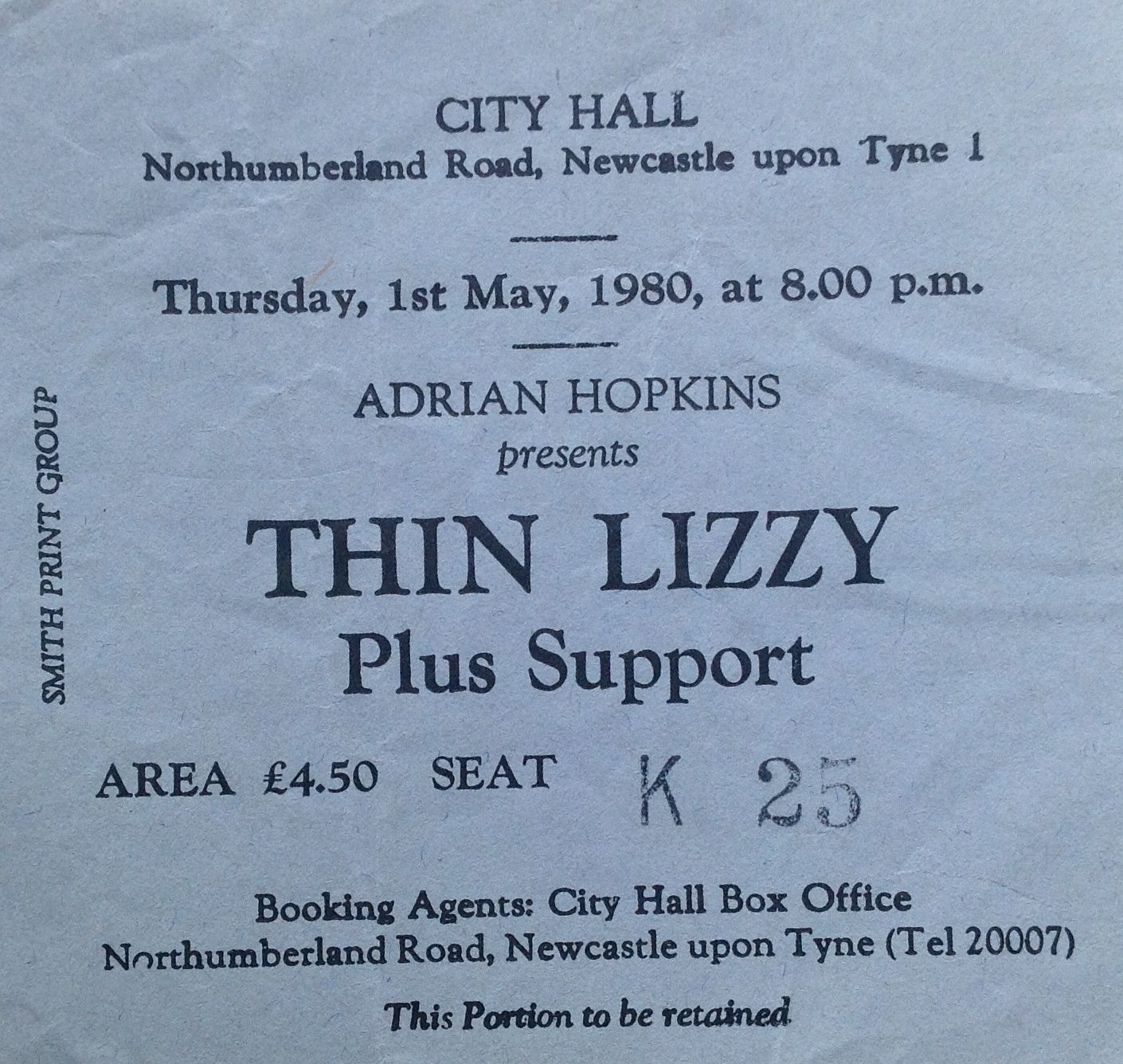
So wait, what was your apprenticing for specifically, what kind of factory was it?
We made circuit breakers. The kind of circuit breakers, big circuit breakers, it could kind of switch on a town if a town has a dropout, you can switch energy from a different town and supply. So it was exciting stuff. It was all very big stuff. The Gulf states, sort of Sudan and places like that, Dubai and all these places were needing a grid and an infrastructure.
We were one of the biggest companies in the world supplying this kind of thing. I'm just going from school, where you know, the worst thing could happen is if you broke a pencil or something, and then the next day you're on these huge heavy machines that you can get kind of get dragged into.
I was about to say at least hopefully none of you cut your fingers off like Tony Iommi or something?
[Laughs] It was possible, it was on the cards, especially with somebody with longhair.
How'd that go over with the older guys in the factories, you guys with long hair and stuff, did they fuck with you at all?
I think they just ignored us really. I think they thought we were sort of long haired punks you know, I think they kind of just put up with it. The thing was and I didn't realize this ‘til later but there was a big influx of us when we went in. It was 200 apprentices coming on at the same time.
And it was because there were so many of these older guys who were coming up on retirement age and they had to have this kind of new blood to kind of keep the factory work and keep it happening. I mean, the factory was the biggest part of the town it was a sprawling, huge place. I mean, it's all housing estates now. It's all gone now. So within 10-20 years after I left it was gone.
There's no industry there at all anymore?
No, no, no, not at all. I mean, all the coal mines got closed down in the '70s and the fishing industry vanished.
Wow. Yeah, I guess that's kind of what happened over here with steel mills and coal mines and stuff too. Alright, so I've read where you've cited Cozy Powell and Ian Paice as your drumming influences along with of course, Black Sabbath and Deep Purple and Pink Floyd. Along with those would you say you were influenced by any punk drummers or bands when you were learning how to play?
I liked the Damned a lot, the way they played, it was very direct. As I said one of the main bands I would see was the Angelic Upstarts, they were a local band and I could go and see them all the time. And I loved them I loved the way they played.
Was there any kind of, you had long hair at that point probably too, right, did punks bother you for having long hair and stuff like that?
Yeah, we used to get shit from skinheads and punks, but then when Venom started, especially when we played Hammersmith Odeon we looked out into the crowd and we realized that there was this mix. Guys with mohicans, guys with Discharge shirts on, Exploited fans, you know and skinheads and it was just this whole mass of people that were there that were into it, they were into Venom and bands that were coming up at that time.
Yeah. I remember when I was a kid, I was into punk and hardcore before metal and the only two metal bands that were acceptable in the punk scene were Motörhead and Venom. It was like okay yeah, that's actually okay even though they were like two opposing camps supposedly before then.
Yeah, it was, it was an opposition. But like I said, once the band kicked off, it changed. I think the whole music scene was changing you know, changing day by day really, over here.
Yeah, so you guys were always into metal and punk on purpose or did it just kind of happen?
Jeff (Mantas) wasn't so much, Conrad (Cronos) said he was. But my upbringing was with these guys who were, because it's heavy industry, a lot of the guys were sort of punks and just street rats, you know? We didn't stay in the house very much, there certainly wasn't any technology.
Yeah, you weren't on your iPhones,
Right, you get on your bike and go out and have fights, you know. Fights like one town, all the young guys would get together and go to the next town to go looking for fights, you know, gang fights. And the police would turn up, this would always happen, they would turn up and just let us get on with it. Because there wasn't any guns and we wouldn't take knives out, it was fistfights and then the police would just let us get on with it until we got tired and go home.
Yeah, that's pretty cool. Maybe they took bets on whos gonna win. Were you in any bands before Venom?
Like I say, the guy who was Venom's first singer, Clive, me, him and Eric, had a little bedroom band together and that's when I got my first drum kit. But no, Venom really was the first thing I put together that made any sense.
So how did you actually end up meeting Cronos and Mantas and form the band?
Jeff (Mantas) had another band, Mantas had another band and he put an advert in a shop, which I picked up and answered. I went to meet him and it was in a church hall, they rehearsed in a church hall. I went to meet him and meet the rest of his band members and we started kicking off, I think we did "Green Manalishi" (Fleetwood Mac/Judas Priest cover), we did "No Class" by Motörhead, and I sort of took him to one side, at the end, I said, You know, the rest of your bandmembers pretty much suck.
I think you're pretty cool but everybody was kind of standing around with a jacket on you know, looking bored and I was like, fuck me, we need to inject something into this, you know, we need to inject some power into it and some energy. And I took him and I said, well listen, I've got this guy who's a singer, and he's got this kind of Alice Cooper vibe. But he kind of grunts he doesn't really sing, he kind of grunts and he's got this bark to his vocals and it's kind of original. And Jeff said, "Oh, well bring him, we're going to see Judas Priest."
So I took Clive along and we met Jeff and I introduced him to Clive and Clive had this long straight hair that went straight down to his ass and he was skinny like he was emaciated, you know, and white, very white. And he looked, he looked like a lot of bands who came in the future like the death metal bands, Clive looked like that. And part of the job I was doing, meant that I was using this stuff called whitewash. And you could paint whitewash on metal and you could mark it out for somebody to you know, you could measure it, mark it out for somebody to drill or, you know, do some other work on it and it just rubbed off at the end of the day, kind of a chalk, but you applied it when it was wet.
So I said to Clive, Why don't we try this stuff? And I stuck this stuff on his face and waited for it to dry and it kind of all broke up and it looked like he'd been buried for like four days or something. And that was our first, I mean Alice Cooper had done all that stuff and KISS had done all that stuff before but just we did it in a weird way. We did it in a much rougher way, a much, kind of a more like corpse paint I guess it became called after that. We did that and we, well, I did the logo, and people said, I can't read the fucking logo and I said, Yeah, but we've been talking about it for like 10 minutes now.
People are gonna look at this and say what the fuck does that say? And I said, And this is gonna be the sleeve it's gonna have a pentagram on it. It's gonna have all these blasphemous lyrics on the back, it's all about fucking Satan and fucking god over and I said everybody's gonna be looking at it and talking about it, whether they buy it or not at least they're gonna have it in their hands you know? They're gonna pick it up and say What the fuck is this? And that's exactly what happened.
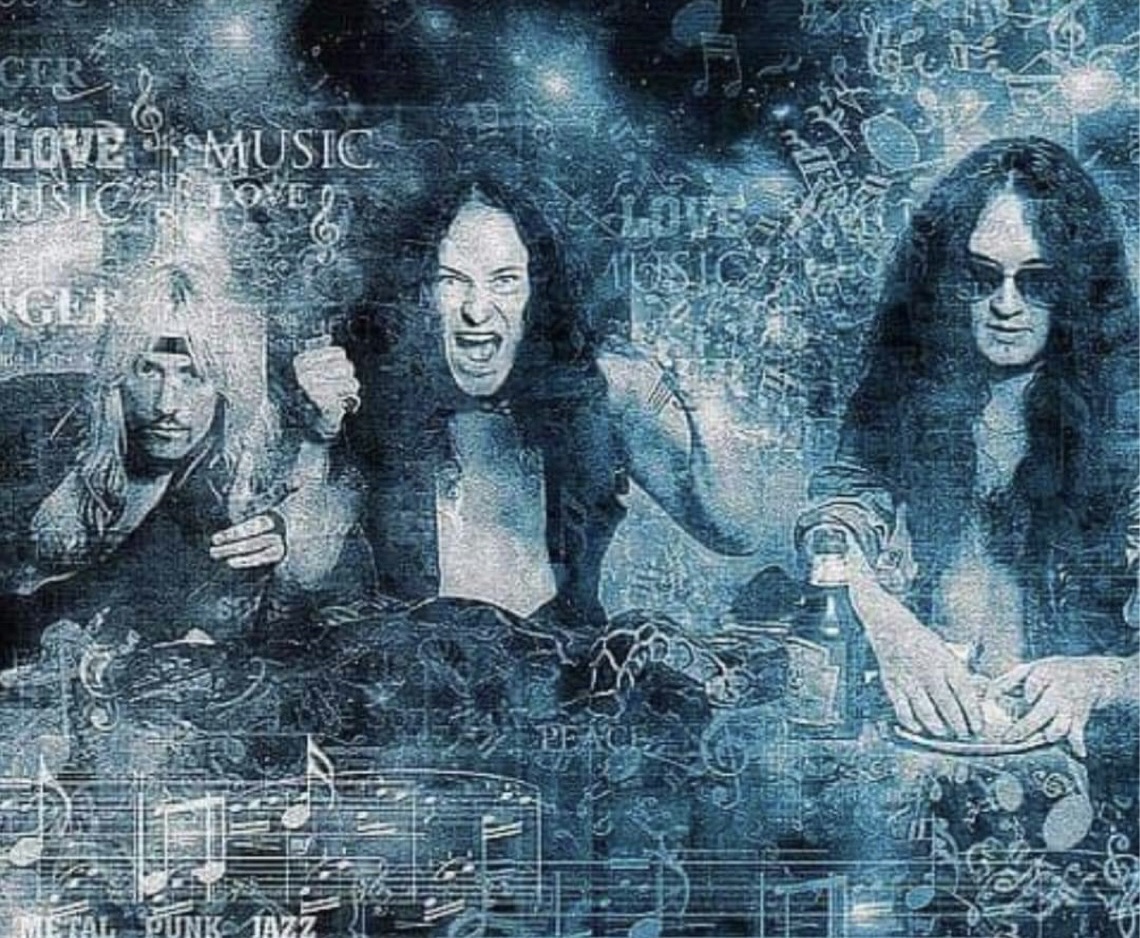
Okay, yeah, actually, I was gonna ask you about where the Satan stuff came from, if it was lyrics Cronos was writing or if all you guys were into it but I guess you guys all just kind of started doing that or?
Yeah, we were all into it Clive especially at that point. Clive was very much reading about Anton Lavey and we we all brought a little bit of it to the table, you know. And after Clive left Cronos started writing more lyrics.
How did that happen? Did you guys play any shows with Clive singing?
We did. Yeah, we did. We played, I think we played two local gigs. I think one was for Jeff's then girlfriend's birthday party or something. We did two or three gigs and Clive was in a, we brought him on stage in a coffin and he came out with manacles on and he was blowing fire. A lot of people were doing it then you know, like Arthur Brown, Coven and bands like that, more American bands.
But even from the beginning, I mean, after our first rehearsal with Jeff, I went out and bought this drum riser and I had this drum riser set up in the field in the middle of where my mom and dad lived and I had the drumkit on it. So when I turned up for the next rehearsal, where his band had been turning up, like, keeping their jackets on and sitting on the stage and I'm turning up with fireworks and fucking drum risers and lights and things, you know really committed and Jeff could see that.
That's awesome.
I said, We just have to get rid of everybody and we'll just get new band members.
So wait, was Cronos already there at that point, just playing bass? Or did you bring him in or what?
No, he wasn't, he wasn't at all. We'd been rehearsing for a while with different members we brought in, we'd advertised and there was a bass player that I had from another guy that I worked with and I brought him down. And then Jeff went out one night with his girlfriend and he went to this other girl's house where her boyfriend turned up and the boyfriend was Cronos. And he said that he worked at Neat Records.
He was a glorified teaboy really, but he got to learn a few little things. It was like an after school thing. It became like a little apprenticeship, you know. And Jeff had already been with a couple of the lads. He'd already been to Neat Records to try and get signed when all these bands like Tygers and Fist, White Spirit, they were all getting signed to Neat Records and on to bigger labels, a lot of them were getting on to like MCN, labels like that. Jeff had already been down there and he'd taken a demo down and he'd been turned away.
So when Cronos mentioned Neat Records and said that he played guitar Jeff said, well, we don't need another guitar player, but we do need a bass player. Then Cronos said, Well, I can do that. I'll play bass, I'll borrow a bass and I'll come along, where do you rehearse at? And Jeff said the church at the top of the hill. So that Saturday he came down plugged the bass in and it was the four of us, Clive was singing, Cronos was playing bass and me and Mantas and that was it.
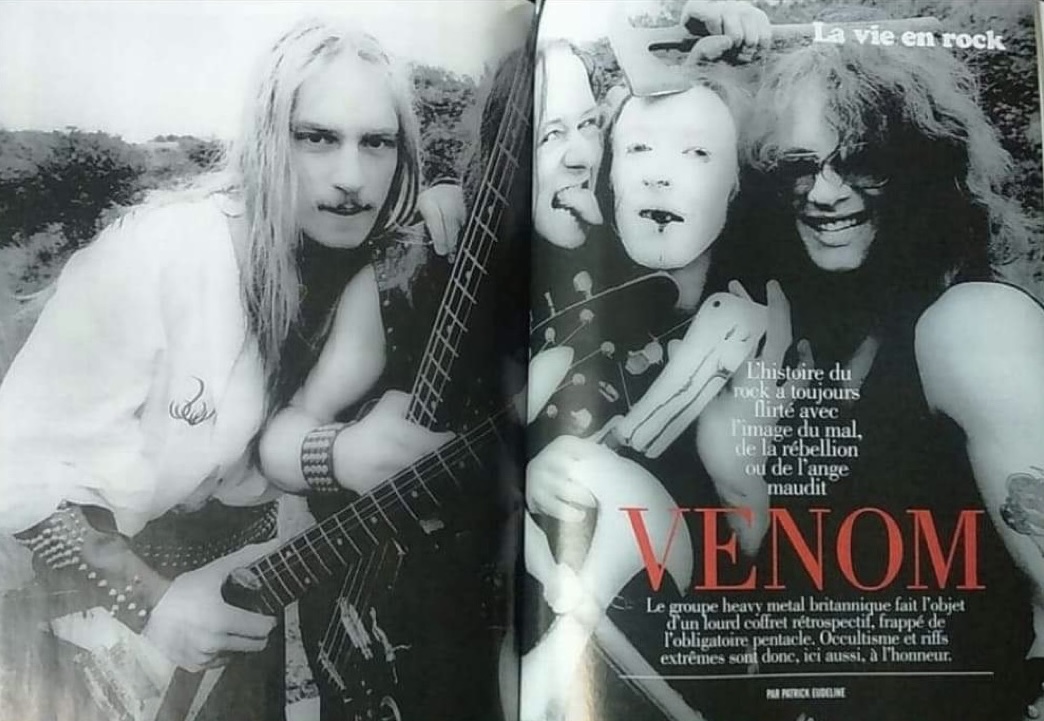
Was it still a consecrated functioning church or was it an abandoned former church?
Yeah. We used the, the church had, on the side of the church it had a community hall. And so we weren't allowed in the community hall on a Saturday or obviously Sunday, then it was a church meeting place.
That's pretty funny.
It's still a church now.
Oh wow, that's pretty cool. They should put a plaque on the church for you guys or something. So wait, when you said you played a couple shows with Clive before Cronos, did you have Venom songs yet, songs that were on the albums?
Yeah, we were playing "Buried Alive" and "Raise the Dead," all of it was original. We even had a song called "Venom." We had a drum riser, we had painted the front of the drum riser so it had the band name on it. We had Marshall 412s. Everything was about going over the top and being as loud and crazy as possible.
How did people react to the Satan stuff and upside down crosses early on?
Well, a lot of people didn't get it and it's only since I've subsequently toured and I've met people and I've sort of talked and so many people have said that they were scared of the band. They saw the In League With Satan single and they saw Welcome to Hell and they said they were frightened of us and a lot of them when you consider you're talking about people who were, I was 20 at the time when that was coming out so it was people who were more or less in their teens and if you're holding your own and you're from the deep south or something, and you're taking Welcome to Hell into the house your mother's gonna throw it in the bin.
You gotta hide it under the bed and so many people have said this to me, you know, and said, "Man, I didn't know what to expect, I was so fucking scared of the lyrics and how blasphemous you were." and we did a couple of videos and the videos came out and the videos were over the top and everybody was like, fuckin' hell and we hadn't really played anywhere, just these two little sort of parties and it would be family and friends that would have turned up, we didn't sell any tickets. We only had really rough early merchandise.
The first thing we did properly was we got offered the Motörhead tour. Which which was a huge deal to us and it fell through. I can't remember why it fell through but Tank wound up doing it. And so we accepted this festival in Belgium, which is the first time I've been out the country and it was about 3 or 4000 people turned up. And we played with a band called Picture and another band called Acid.
We did a full set there and I believe that was the first time Cronos sang. Just the three of us went over and with Eric Cook and Eric was there as a guitar roadie. So he went over as the guitar roadie he just said, "You can see how big this band could be. Why don't I make some calls?" Then I recall he called John Zazula, and the next two gigs we did were in New York. So the second proper gig I ever did was in New York City.
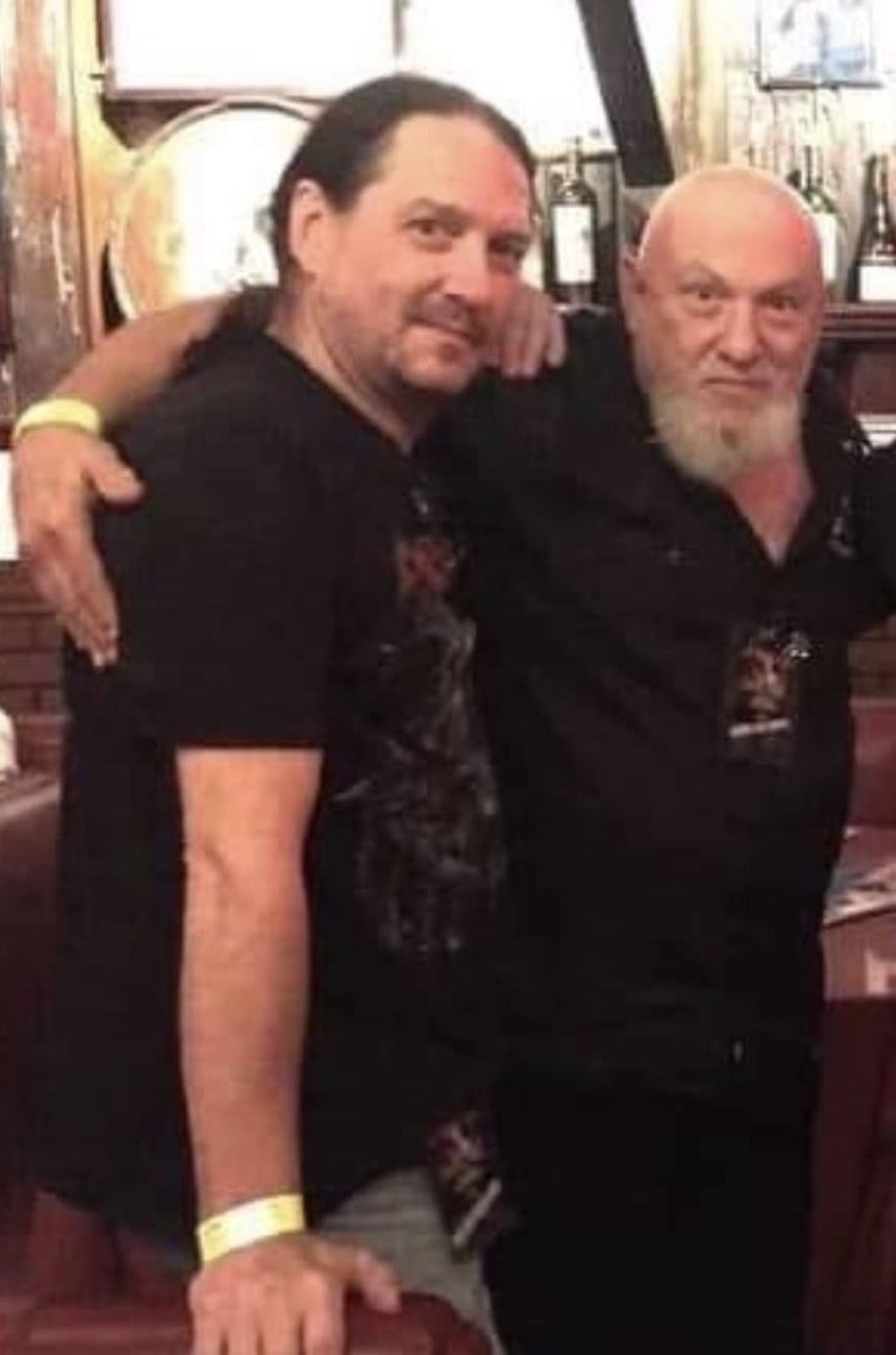
Nice! So that would be Megaforce Records right? What had they put out? They hadn't put out Metallica yet at that point?
They hadn't put Metallica out yet. When we got there they had just got the tapes for "Metal Up Your Ass" and of course Metallica supported us in Staten Island. So we struck up this thing with them and John released, I think he did a single that we hadn't released, we hadn't intended to put out ever, I think he did a thing where he pulled two or three of our singles together and did like a four-track EP. And he put some posters up in the shop in Rock n' Roll Heaven.
Wait, there was a Venom single on Megaforce?
Yeah, that's a very early thing that John did. We did it and when we came back straight after that as well, we did a thing called American Assault. That was because we hadn't got a proper deal over there for all the early albums and singles we released.
Over two or three years we released three albums and about four or five singles, which Americans didn't have and the Canadians didn't have, so we did a thing called American Assault, which would bring all of our stuff into one album or as much as we could and then we did Canadian Assault, which was was the rest of the songs.
American Assault, that came out on Combat Records...
That's right, yeah. At the time, there was this kind of thing where small labels like Neat Records were doing deals rather than having a big worldwide distribution deal they would do a deal with Combat or do something with Banzai for a territory, do something with Roadrunner for their territory. So that, you know, all that, there was an Italian one, the Dutch thing (..Assault). Each territory would have their own sort of record label and get the rights to do the Venom stuff. So it made a worldwide thing happen without having a worldwide distribution deal.
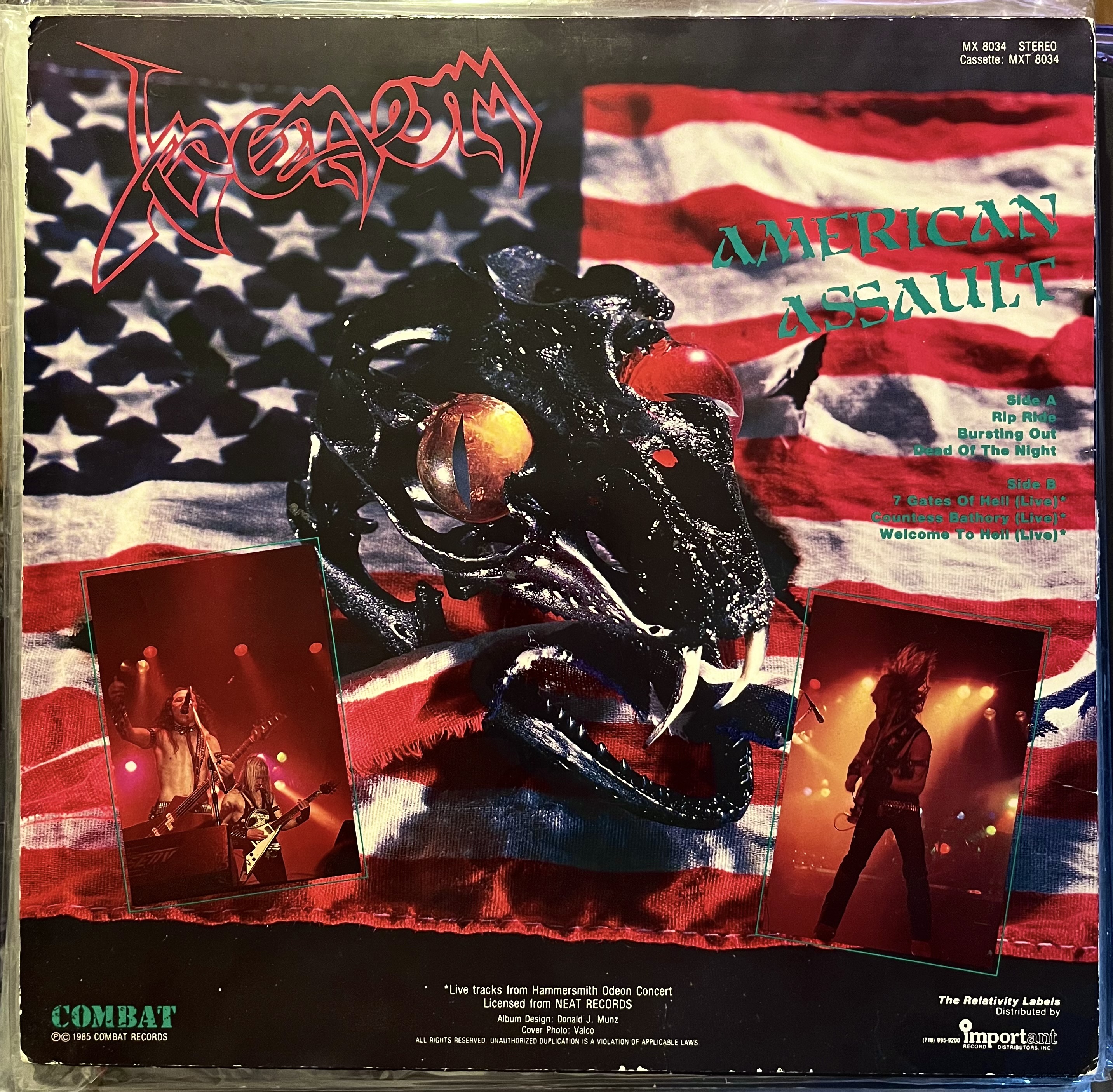
Yeah, gotcha. Just thinking about what you were saying about people telling you about seeing the early photos and records because I remember I must have been about 14 and like I told you, I was into punk and hardcore mostly and a friend of mine showed me the In League With Satan 7-inch.
I remember looking at the band pic that looks like you guys are on a beach or something but you're holding like axes and hammers and stuff and I remember being like, Jesus Christ, these guys look fucked up [laughs]. Was that a planned out thing for the photo shoot or was that just how you guys naturally were, like, "OK we're taking pictures. Let's fucking do this!"
[Laughs] It's kind of how we were. It's like the names as well. I remember clearly, Jeff and I were walking down High Street in Newcastle, and we met at a music shop and I think it was Jeff first turned around, and he said, you know what, I don't think I want to be called Jeff Dunn in the band and I said, "Well, I've been thinking about that and it doesn't sound right. You know, Lemmy's Lemmy isn't he?" He said I've been thinking about being called Jeff Mantas and I said, "Okay, I've been looking at the Bible and I've come up with this thing called Abaddon. It's like the Hebrew version of something called Apollyon. And I like the fallen angel thing."
We bump into Cronos, he said, "You know, guess what, I've had a thought, and I'm not going to call myself Conrad. I'm going to call myself Cronos." We were like, "Fuckin' hell, we've just been talking about that."
So the whole image wasn't really planned. The logo that I did, wasn't planned to be unreadable. The pentagrams and everything weren't planned to make you...it just all came together. A lot of the photographs that I initially did as well. I mean, on Black Metal there's two photographs of me. There's one where you can't see my face and when I turned that over to the record label they said you can't actually see you. I said, "No, well, that's part of the air of mystery."
Think about it when the black metal scene started and all the hair in front of face and all that kind of shit. Everybody started doing that. And it was like, we started quite a lot of things that, you know, weren't, we didn't sit down with with paper and pen and say, right, we need to be called this and we need to have pyros here and here, we just did it. Just fuckin' do it. If we don't do it, It's not gonna get done.
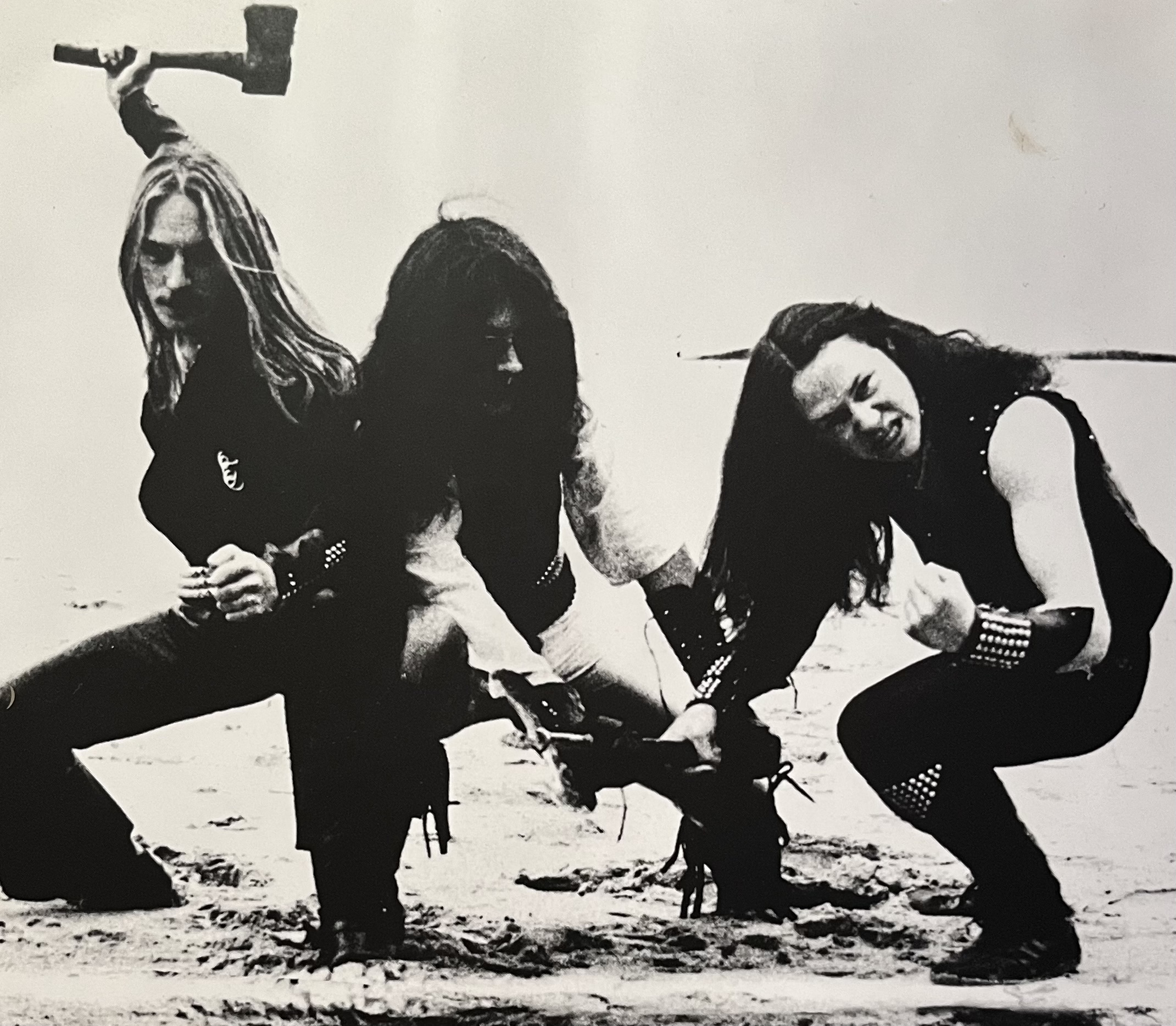
Right, I hear you. So the logo, you were just sitting around drawing in your room one night or something? How'd that happen?
Yeah, when I was working in the factory, there was big periods where there was nothing happening. So I would stand, you weren't allowed to sit down or sit and smoke, or have a cup of tea, you had to make it look like you were doing something so I would stand at this locker and I would just draw all these logos and the pentagrams, and all this kind of stuff. And I did like the Bloodlust logo, and I did photographs for Manitou and all these sort of things and they were all just kind of commonalities, kind of similar to lyrics and the same with riffs and art designs.
You wouldn't say, "Oh, I've got a riff today. Let's work on it." You sort of go through three or four different things and all of them brand new and every time we came up with something, I'd sort of go, "Yeah, wait a second 'cause I've got a drum fill that'd fit that. Don't just think of like, playing straight force through this section. We're going to work it out 'cause I've got a tom thing that's working out as a specific piece." And that's how we got some of those eclectic parts.
The other thing was, we were working for vinyl at the time. So you're talking two sides of a vinyl album but we're talking at best five songs on each side. So you had to have a great starting point, an intro thing with great song to kick the album off and then you had a great song to finish side one with and a brilliant song to start side two with four or five in the middle to fill it in. So we didn't really have any fillers, the albums were written specifically for that specific format.
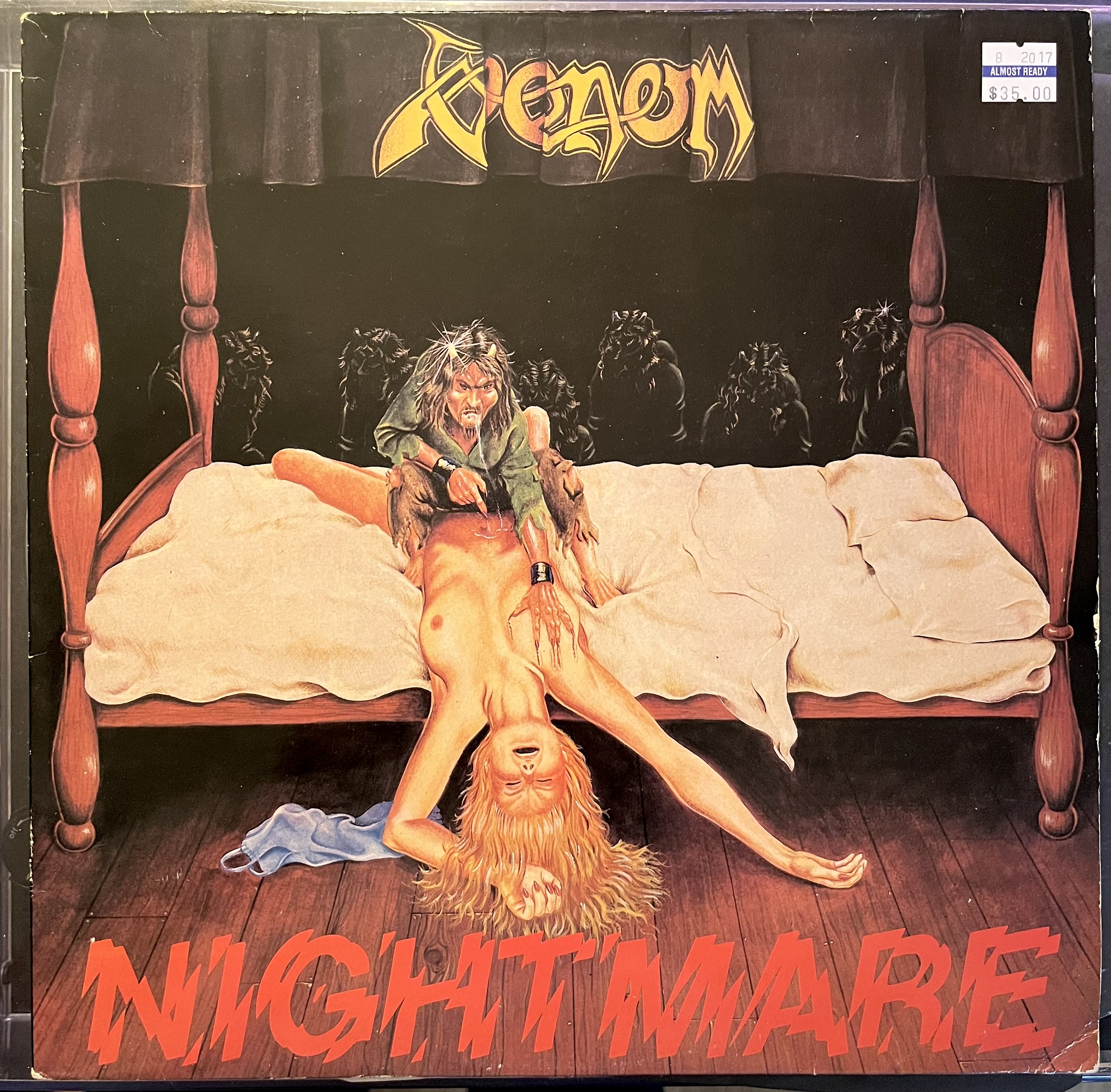
Yeah, that's cool. I was gonna ask you how you came up with the "In League With Satan" drumbeat, which is obviously not a conventional one.
It was basically because I was brand new at the whole thing. I didn't realize that the snare was so integral to the rhythm work.
For me, I bought this big drum kit that had loads of toms, and I just thought, well, that's where I'm gonna go, I've got two bass drums, I've got four or five toms, two big floor toms, I'm just gonna get stuck in around here and I didn't realize you're supposed to play 4/4 and a bass drum on the one and a snare on the two and a bass drum on three and a snare on the four. You know, the snare didn't really interest me at that first recording session.
That's funny, because I was just reading an interview with Dave Lombardo where he talks about how many toms you had.
Yeah, it was just like, I didn't have any real formal lessons. I certainly didn't, we didn't have online but I didn't go look up books or anything like that. So everything was self taught, but I was also aware of introducing different rhythms and different feels. So I wasn't thinking, oh this is this is where I would play a paradiddle or a four stroke roll. I was thinking, this will get me to that section when the guitar's gonna come back in.
So did you ever end up taking lessons? Or did you just kind of figure it out from listening to records eventually or something?
Yeah, I only got a drum kit because Jeff posted on the wall that he was looking for a drummer. I was playing bass in the bedroom band with Clive and with Eric. When Jeff said, you know, drummer wanted, I thought, right, I've gotta get a drum kit. When I turned up, I had no idea what I was doing. I didn't even know really how to set a kit up. I only knew from watching sort of videos, and videos were few and far between.
I think the first video I've ever seen was Deep Purple, California Jam. Eric had a video recorder, his mom and dad were quite weatlhy. He had bought a VHS and put it on. There was nothing like that on TV. Unless you went to a gig to see live bands you couldn't see any of this stuff. There was no platforms to see it on. I think it was $40 or $50 for this VHS tape and it was like a thousand quid for the player. You know, which was like buying a motor car.
Yeah. So that infamous "FUCK OFF" rejection letter from EMI, was that real?
As far as I can tell, it was real. It was two weird things that happened, because when you went into Neat Records you went in a door, like a front door, which would obviously be locked then you went upstairs to another door, a security door, then you get into the building. And between the door and the security door was just this corridor and this letter was left in there, I think it was jammed in a handrail or radiater or something. It was weird. And the other thing that happened was the same thing happened again but it was a letter from Anton LaVey's daughter and all it said was, "Shemhamdorash, Lord Satan approves."
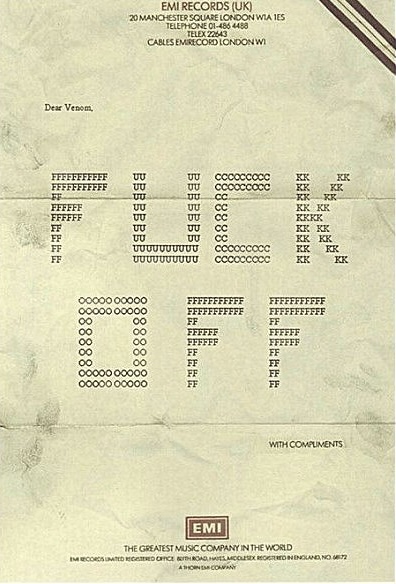
It was a handwritten letter from her?
Yeah, handwritten, it was written in blood. I'm assuming it was written in animal blood or whatever.
Whoa, did you guys write to her first?
No, she just wrote the letter. It was signed by her, I'm assuming it was her.
Did you save any of that stuff? Or like the original Venom logo that you did by hand?
Cronos probably did because he was always a bit of a hoarder or a collector. We did have so many like Michelle Pearson in France and John over here. We had some great collectors who had some tremendous stuff. I did go to my ex-girlfriend's house, who I was with at the time. And she said, We're cleaning up the loft. You want to come have a look at this stuff. And some of the stuff, some of the Venom stuff that was in there that I'd given her, it was incredible.
It was just such a collective bounty and I'd forgotten I'd even had it, you know. Just since I've had my kids, I have two young kids, I've only just started buying back albums and T-shirts and things. I never thought I was gonna have anybody to leave it to. So I'm actually buying stuff back now.
That's cool. So, this is kind of funny but I just I read a quote in the Louder Than Hell history of heavy metal book where Cronos tries to say that he was the only true Satanist guy and that you and Mantas were kind of posers about it. How do you feel about that?
No, that's not real. I used to read a lot and a lot of the inspiration that we had was coming from stuff I was reading. I mean, he might have thought that doing seances or something, it was a mistake to start off, but the one who was more drawn to all of this was Clive Archer. Clive was very heavily into that. And as far as he was concerned, it was always going to be that type of a band if he had anything to do with it. And that's where that came from, it was very little to do with Cronos.
Cronos, just took off the fact that we were doing that. He was actually in a glam band, he used to wear make up and he was really happy. He says now that he was a punk and that he was in London during the punk scene, but he wasn't. He was into David Bowie and that sort of glam rock stuff, you know, like Roxy Music. That kind of stuff, that was it. That was his background really. I mean, he saw the opportunity with the band and I think he must have saw that me and Jeff were fired up. Me, more so than Jeff.
But Jeff's background was sort of KISS and Judas Priest and that was it. I think Jeff never even saw Motörhead live. Not saying that to put him down but it's just that that's what his background was, you know? So the biggest influence Satanic wise was Clive.
Do you have any memories from the recording sessions for Welcome to Hell?
Yeah. We we were going in to do we thought a single or a demo. I'm gonna carry my drums up eight flights of stairs up to the studio. The studio was way up in the roof. So I was carrying these fucking bass drums up the stairs, I regret being a drummer! The guy came out of the office and he said, All right, how many songs have you got? We were like, well, we're doing an EP. so we've got three recorded and we're working on a fourth song you know, if we work all weekend, then we'll get four done.
He said, "Well you need to do an album." We were like, "Ah, right."He says, "So you've got two days, you've got Saturday and Sunday. I'll give you Monday as well. So we'll have three days to do Welcome to Hell and we had to write songs in there." Jeff had some riffs, I had some lyrics, Conrad had some lyrics and we just had to pull it all together. When we got to "Black Metal" a year later we were royally allowed six days [laughs].
I was gonna ask you if the budget got better for Black Metal.
I think that's where a lot of the rawness comes from. Kind of hurry up, get it done. If the drums were all done in one or two takes that was the best you got. If I made a mistake there wasn't any fancy editing machines like there are now so if you made a mistake it was on tape and that was it. And we went down to two-inch tape. And that will be it so that the drum take was the drum take and then the guitars, obviously you could overdub them and the vocals, you could overdub them so you could go through and do different takes. The drums have to more or less all go down as quickly as I possibly could.
Wait, so you guys didn't record that live all at the same time together?
We would do guide vocals, guide bass then we'd record the drums. And it was a 16 track when we started, when we did Welcome to Hell and then they bought a new desk and a new, I guess we made a lot of money for them. They made it into a 24 track with a new machine and new desk. So yeah ya know, we were multi tracking and that was what went down and maybe some of the guide guitars got kept if I remember rightly. But when we did the very first single, In League With Satan, we had an engineer and producer a guy called Steve Thompson and what we did was, what we used to do at rehearsals was Jeff would tune his guitar to itself not with a tuner, so his guitar would be in tune, all the strings would be in tune.
Cronos would say, "Okay, give us your A." So he would play him an A. Cronos would then tune his A string and then he tunes his bass to whatever Jeff was tuned in. Consequently, a lot of people who tried to play Venom stuff, like now, and then when they meet us, you know they'd say, What the fuck tuning were you in? and I'd say that's just, they were really tuned to themselves, they didn't have a tuner.
So when we came to do Black Metal it was a different engineer and he said, "Okay, what're you tuned to," and we all looked at each other and went, "What do ya mean? He's gonna tune up then he's gonna tune to him." He said, "No, you have to have a tuner. You have to be in tune you have to be in something, what're you gonna be in?" He went to the piano and he would play a note on the piano and say, "There ,that's a B, or that's a D flat or that's a C. What are you in?" Jeff's like, "We've been in the same as we were on the single." Steve was like, "Well, how do you know? That was a different day, it was a different situation." So we say, "We'll go downstairs and we'll play the single, so we'll put the vinyl record on a record deck with all the things that can can change," and we tuned up to the single and Welcome to Hell is in roughly the same tuning the single was in.
Wow, that's crazy. I didn't know that. That makes a lot of sense, though. That's nuts. That's awesome. So okay, then Neat gave you a bigger budget I would assume, for Black Metal, since they knew you guys were successful at that point right?
Just in as much as we got more time in the studio.
They didn't give you more money they just gave you more days?
Yeah, we just had days we didn't get any money.
Okay, gotcha. Did they pay you royalties for albums sold and stuff like that?
No, not at all. We were doing gigs and getting pyro and stuff like that they would foot the bill for some of that stuff. But we didn't get anything. The only thing we got was I had to give up my job at the time and I had to go on the dole or like income support and that was 30 pounds a week. So we had to come off the dole and Neat Records gave us, the three of us 30 pounds a week each. So that's all the royalties we ever got.
Same as getting the dole. Were you still living with your parents at that time?
No, I'd moved out. I was living with a girlfriend moving around different places. We had a flat where all the band gear was kept and we used to go rehearsing at nighttime, that's all we could afford. And we had this flat in Wallsend and we kept all the gear there and when we finished rehearsal, we'd go back there and we'd start writing lyrics and things and having a drink. It became kind of a band flat.
So who came up with those evil quotes on the back of the first few albums like "We drink the vomit of the priests, make love with the dying whore..." and stuff like that?
I think it was a mixture of all of us. I'm not even sure if Clive might've had some hand in it before that. But yeah, we all had a hand in all of that. Like I say, coming back from rehearsals and things, we’d just spill stuff out and write it down. We didn't have anything to record it on. We just sort of wrote it all down. Somebody would say, what was that, sort of come up with a line and another line and another line and then write it all down, and then sort of put it all together. And I still do this now. I'll be sitting watching TV at night sometimes and something'll come in my head.
So I've got to have a pad beside me with a pen or pencil or something. I just scribble it down quickly and it doesn't make any sense in context but then you can throw some of the lines on it and I can take it to the other guys in the band, especially Steve [Hoggart, bassist/singer in Abaddon], who is an old punk. I'll take it to Steve and I'll say, "I've got these few ideas they weren't based on anything specific or maybe they were based on a hanging, somebody hanging themselves or somebody threatened to hang themselves and how the family responded to that, you know and how much hurt it's caused."
Then that'll inspire him to add some other stuff and then we kind of come up with a riff one time and we'll be playing it and Steve goes, "I remember those those lyrics you give me, I've written a few more, and let's try it with this song." That's the kind of cathartic way I've always worked and it's always worked for me. It's always been a band thing, you know?
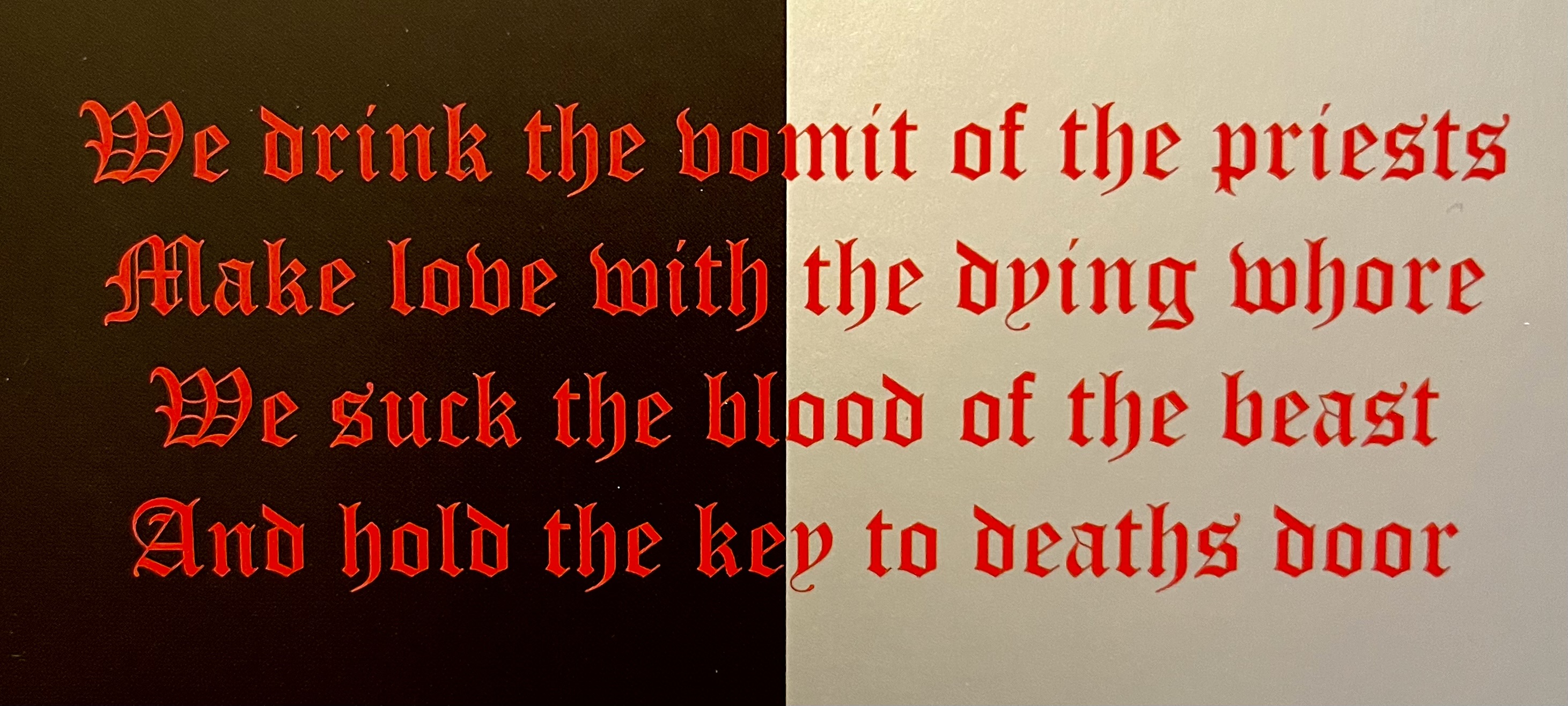
Definitely. What's your favorite album credit description/credit (Venom was never listed as just guitar, bass, drums etc)? You're always credited as something like "Barbarian guardian to the seven gates of hell" or "World War Three" instead of drummer. What's your favorite one of those?
I suppose I like that one. Just again, it was another thing that other people weren't doing. Which is another thing that was on the album where people were looking at everything, you know, the photographs, the logos, the pentagrams, all of this before you even put the record on, you know. Whether it was a single or it was an album or a video it was always about being as over the top as possible in as many things as possible.
So what's the 125 inter-city Express? That was one of your credits on Black Metal.
[Laughs] That was a train that was being developed at the time, which ran from Newcastle to Edinburgh in Scotland. It was called the 125 because it did 125 miles an hour. Which, not many trains did in the 70s. It was supposed to get you from London to Edinburgh in three hours.
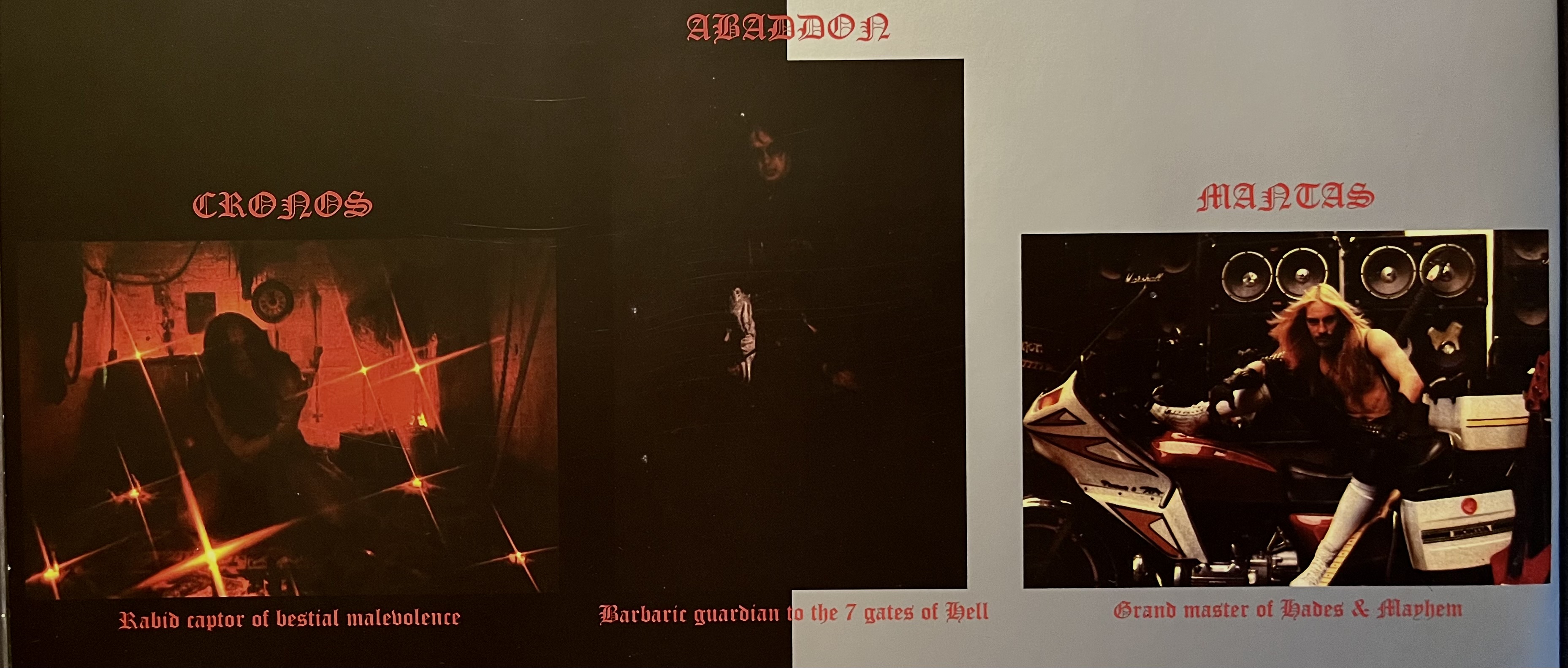
Nice. Okay, back when Metallica was opening for you guys on the Seven Dates of Hell tour in '84 did you realize they were destined for superstardom at the time, or were you like, they're just a band or whatever?
Not really, because we also had like Slayer open for us, we had Exodus open for us. We had Sepultura, Cradle of Filth, Sodom, Destruction, bands from all over the world that looked like they could be superstars and Metallica were just one of the bands, to be honest. They seemed to be enthusiastic, crazy young kids when we were playing with them. And we were young ourselves and we were crazy.
But then you know, they were like two or three years younger than us even. I mean, it's like us going to America for the first time. You know, it was like a whole new world, a million differences and they were the same in Europe, you know? Kids in a sweet shop that hadn't been drinking very long and they weren't very good at it. But they were incredible to watch, they were fantastic. But so was Slayer.
My favorite band was always Exodus of those bunch. We just had so many bands that we were working with that were opening up for us that everywhere we went, there was another Metallica. I didn't expect them to be like an AC/DC size band but then again, I grew up with bands, like I said, with bands like Tygers, and Fist and Raven and lalalalala. Any one of those could have been Metallica, you know?
Yeah, I hear you. What what did you think about the audiences in the States compared to what you were used to in the UK? Particularly that Staten Island show?
it got crazy. American audiences were fucking insane, completely over the top. I hadn't seen stage diving before. People were diving off everything you know, off the PA, off balconies, it was insane. And then we went to Europe, into Eastern Europe and they were fucking over the top and then you go to South America and it's, you know what I mean? Every time we go somewhere, every time we do something, it's just this form of music just goes through the fucking roof and everywhere is so enthusiastic.
Even when people are a little bit older now you know, people going to see the Venom Inc. stuff kind of tended to be in their 30s, 40s whatever. Still very enthusiastic. They have been their whole life, the people in the Venom fan clubs all over the world are so fucking enthusiastic. They travel all over just to meet each other. Abaddon (the band) played in May at a festival called Mearfest and Rob came over from America just for that one gig at a pub in Newcastle. People were coming from Switzerland and France, Germany and Belgium, it's fucking insane man.
Yeah, that's really cool. Let me ask you about the "Nightmare" video, is that the only official video you guys did back in the day?
Yeah, I think so. I think that was something that we kind of got money out of Neat Records for that one. The only thing that they actually paid.
Yeah, you can tell it's kind of a production.
It's a different production. Yeah, it was just an idea I had. There was a castle near us, this one particularly lovely castle. My first marriage, I got married there. They did weddings there. This one weekend, they had nothing particular on and they rented it to us.
We had an idea to get a couple of people in there like the actors and it was like the MTV sort of era where bands like Iron Maiden were getting played and Judas Priest were getting played with "Living After Midnight" and all that sort of not live videos but kind of more acting type stuff.
What about the two actors, the couple in there?
There was also a guy who was a dwarf and he's in it for a short period. There's the old lady. There's a girl, she was a girlfriend of mine who's in the Rolls Royce with me at the beginning. Cronos's brother's actually in it.
That's cool. How come you guys didn't make any other videos after that?
Well, after that was pretty much around the time that Jeff was going to leave and there wasn't the inclination you know. We did one album after Possessed with Jim Clare and Mike Hickey and just around that time it was done and then that's finished, and then I got Tony Dolan involved and then that ran two or three albums. We never looked back at that kind of video thing again, until with Abaddon we've done a couple.
Nice. So yeah, that's what I was also gonna ask you next is when you guys were about to go do that US tour [The Ultimate Revenge tour], I guess it was '85, with Exodus and Slayer and Mantas bows out last minute, saying that he had chicken pox. Was that true at all?
No, I don't think so, he just didn't want to do it. We got two guys in, we got the guy from Fist and the guy from Avenger and they still didn't, me and Cronos had to rehearse two nights right through the night, right through to daybreak through the night just to get these guys up because we couldn't pull the tour up, we couldn't do it because there's too much invested in it and it was too late it was last minute and when Jeff actually came back, I think we were in Chicago and he came back and everybody was pleased to see him.
And I remember coming off stage and saying, "It's fucking great to see you. How ya doing?," and him saying, "I don't wanna be here, I just don't wanna do this." I was like, "For fuck's sake, we got two weeks to go, two weeks," you know what I mean? I mean, he did it but even when he did it he had to go home but the lads stayed on.
I didn't know he joined you on that tour at all.
Yeah, there was a point where there was two guitarists on stage because Jeff claimed he didn't know the material. It was just like fuckin' heartbreaking you know?
Yeah. That's crazy man. Do you have any idea why he just suddenly didn't want to do it anymore?
Well, everything after that was dragging his heels so I'm guessing he was just of a mind to leave anyway. I think all the Satanic thing and all the over the top thing, he thought he wanted it and he talks about it now as if he wanted it but you look at it now what he did straight afterwards, the Mantas stuff that he did was so middle of the road, kind of Journey meets Whitesnake or something. Nothing like what Venom were headed towards.
We were aware then that we were in the middle of a fight because Metallica were going through the roof and Testament were coming out and 101 bands from everywhere were coming out and being faster or more over the top or more Satanic. We were very aware that we needed to defend our ground and it was only a three piece band and to be like, one man down and it to be the guitarist down was pretty much devastating.
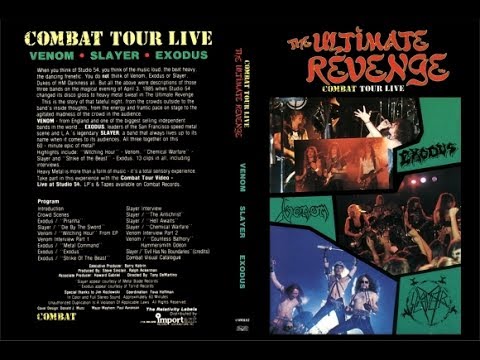
Yeah, for sure. So when you guys did that tour, you played the former Studio 54 in New York. Were you aware of the significance of that location at all like with the disco thing?
Not as much then as I was after. When we got there, it was more like people like [Elektra Records A&R executive] Michael Alago was there who've been part of the scene, our kind of scene and the disco scene, all that kind of stuff. Michael and people like that and that's what sort of educated us on the fact that it wasn't just another gig. It was this piece of American heritage really,
Pretty much yeah, music heritage.
We were this kind of antithesis to the place. But I remember it being a great gig. I remember enjoying the gig really well. It was a strange stage. But I remember I enjoyed it really well.
Is that is that the gig that the backstage footage of you guys from the video is from, from the Ultimate Revenge video? I know that the live shots aren't from that show obviously.
Yeah. Obviously, we didn't want any of that stuff to come out because as far as we were concerned we were still Cronos, Abbadon, and Mantas. This was just a glitch. Because it was such a big gig it was being filmed whatever happened. So we went along with it and told them, "OK, you've got to turn the cameras off when we're playing," and they said, "Okay, that's cool."
We said, "We can give you other video stuff that we've done that hasn't been released yet, but you can't film anything with these two guys in the band," and so there was never anything other than stills of the guys. There was never anything filmed.
Yeah, gotcha. So okay, then Mantas obviously is gone but then eventually it's you and Mantas with Demolition Man for the Prime Evil album right? How'd that end up coming together?
I had a management company with Eric, who was Venom's manager and we had a recording studio that we bought off Brian Johnson, who was the singer in AC/DC. Brian was from Newcastle and we met up with him and his wife and we bought it from him. So we had the studio and we had a lot of ideas. Mantas was kind of doing his own thing, but that had been kind of fractured and I knew Tony Dolan (Demolition Man) from being with Atomkraft because Eric's brother Jared was the drummer in Atomkraft. So he'd kind of grown up around me being in Venom and we got him the job in Atomkraft.
So me and Eric had a deal with Music for Nations for some of the other bands that we had on the label, and I was talking to Martin (from MFN) and he said, "Why don't I give you a deal for a Venom album," and I said, "Well, what would such a deal entail?" And he came up with a big recording budget, he said it needs to be recorded really well, blah, blah, blah. I said, I've got a great studio, he says, "Great, I'll pay the daily rate," and he says, "I'll pay for a great studio down in London to mix it and I'll pay for a proper producer this time." I was like, great, great.
So we did this deal and got excited and Eric said, "You do realize you haven't got a fucking band, don't you?" I said, "Yeah, I understand that." So the deal that they'd given us was based on Cronos, Mantas, and Abbadon and Eric said, "You'll never get Jeff and Conrad in the same room together again to do this." I said, "No, but maybe there's a second best..." So, I went to Dolan and I said, "I've been offered this deal and you're still working with Mantas, he'll still listen to you when you speak to him." And he said, "Well, yeah, I guess so but what do you want us to to say?"
I said, "Well, tell him that we've got a deal, a three-album deal and that I want him back, as commited as he was the first time." Dolan says, "Great, "and he then says, "And what about the bass player and the singer, do you want me to help you look?" And I said, "No, I want you to do it." He said, "Oh fuck, I didn't realize you were asking me to do it!" I said, "Yeah, you're a veteran, you know all this stuff probably better than me and, you know, Jeff relies on you, Jeff's relied on you for years and I think if Jeff wants somebody in his corner it'll be you."
And that's what turned out with Jeff and Dolan. I don't know much of the timing or background with Empire of Evil, but they'd been working together for years. And it's because Dolan knows how to push Jeff's buttons and Jeff accepts that. And it worked. It worked great and we did some great albums and we had some good tours and the odd video.
So wait, how come there was no Cronos, like you didn't even consider trying to get him in that or he refused or what?
He was doing his own thing with the other guys who had been in Venom when I left. I left and he called the band Cronos. He had an American drummer and he was still touring, he was doing stuff, but I figured it's pointless trying to do that.
Okay, so you didn't even ask him?
I didn't ask him, no. Though in the back of my mind, it might be something that could happen and it still is. It needs the stars to align.
Aren't we coming up on the 40th anniversary of Black Metal?
That's right. It's coming up, yeah.
I saw somewhere that Mantas actually said he hopes or wants the three of you to do something for that. I don't know, obviously but...
He did but what he didn't do is he didn't ring me and he didn't ring Cronos. What he should've done is give us a bell rung instead of going on Blabbermouth about it. I would say it's you that splits it up every time. Every time we've broken up it's been him that's done it.
Yeah, I was gonna ask you, in '97 the Cast In Stone album comes out with all three of you guys, how'd that happen?
Well, again, that was about me and Eric. We had as part of our management company, we used to video bands at the Dynamo festival in Holland. So we did it for like 10 years. We did Type O Negative, we had Cro-Mags, so many bands that played Dynamo festival that we filmed. One year I'm sitting down with some of the crew, we used to go and have a drink with them at hotels and whatnot.
I sit down with a crew member and with Andre Verhuysen who ran the show and he said, "So when you gonna get Venom together?" and everybody was having a laugh and a drink and I said, "Oh yeah when hell freezes over." And he said, "No, seriously, why don't you get Venom to do it?" I said, "Why, what would be the point?" And he said, "So you could headline the Dynamo. We'll set aside either next year or the year after, the Saturday night, Friday, the main night. Anything you want pyro wise, anything you want background wise, anything you want to happen can happen. But you have to get the other two on board.”
So me and Eric tried for like a year to get them to sit around the table together and eventually it happened. And Eric had in the meantime done an album deal because Dynamo was going to be a huge deal but it wasn't gonna pay us any money so how are we going to pay for things to happen? Pyro wise, staging wise, blah, blah, blah, blah, blah, and pay for our rehearsals and all this kind of thing. But they weren't paying us any money. We could sell merch, we could do this stuff. Eric said, If we're gonna do that why not do an album deal?
We did a three album deal. The first one was Cast In Stone. I It turned out pretty good. And we did a handful of dates. But again, Jeff got cold feet and wanted to leave. It was a ridiculous situation because me, Jeff and Eric sat around a table in a hotel in Newcastle and he said, “I can't work with Conrad. I just can't work with him. We're going to have to sack him, we're gonna have to get rid of him.” And we sat down I was trying to convince him not to and I mean, we used to travel separately, and we stayed at separate hotels and everything. And Conrad was never that bad. Cronus was never that bad. He was never that big of an asshole but Jeff just used to think it was too much.
They just didn't get along, I guess right or...
They didn't get along. And we did the album, we did a handful of dates, we did Milwaukee Metal Fest and we enjoyed the dates, we enjoyed the gigs, we enjoyed the album, the way we recorded the album. And it came time to do the second album and Jeff had sat down and said I can't work with him and he said, “You're gonna have to sack him.” So I wrote a letter to Conrad, sacking him.
A few a few months later, I get this call from the record company and they send me this CD over, "This is the second album. You've got to come to Germany to record it. They've recorded everything. You've got to come over and put the drums on it.” And I was ringing Eric and me and Eric started fighting, we've been friends since, we were like brothers man. We saw each other every day for like, 20, 30 years. Me and Eric started fighting about it and he said, the record company is going to sue everybody blah, blah, blah. I said, "Well, you’ve got to get Jeff to talk to Conrad then and put it right."
Nothing ever happened. Conrad went over and did his part, Jeff went over and did his part, I was supposed to go and do my part. I just said no, I told him, I'm not fucking doing it. This is ridiculous, we sacked the guy, we gotta sit down again around the table and put it right. Well, you know, I'm not just playing on the record just for the sake of playing on the record and I'm not going to do it when all the guitars are already done and expect me to put drums on top of that. It's not how Venom's ever done it, it's not how I want to do it.
So Conrad got his little brother in. Antton's a great drummer, a great guy. They got him in, basically shoehorned him in and said you're the drummer in the band now. So there was nobody else to try, nobody else interviewed for the position that was just, right, you're the drummer.
That's weird, that's very weird. Let me ask you about something a little bit different, do you remember in 1986 Venom played with Black Flag at City Gardens in Trenton, New Jersey. Do you remember that show?
Yeah, I remember. I remember more afterwards because of Rollins doing his stand up stuff.
Did you ever hear or were you aware of how they did a soundboard recording of just Cronos's between song banter, did you ever hear that?
I didn't, no.
There's a whole thing, it actually came out on vinyl on Ecstatic Peace! where it's just Cronos and he's like, "You're wild man, wild!" and stuff like that. That's the whole record. It's a 7-inch, you never heard that?
No, I never heard it. I'm surprised the Beastie Boys haven't sampled it.
They actually did.
OK, I knew they did something.
So did you have any interaction with the Black Flag guys at all at that show?
Only as much as we would do with with bonds at any show, you know. We would sort of turn up and have a soundcheck and kind of hang out with whoever was there whether it was crew or whether it was other bands or some fans. There was no such thing as a meet and greet. We would just turn up and you know if people were at the stage door you would just sign stuff and hang out.
But I mean, I remember hanging out with the Metallica lads because we were there in John's [Zazula] house for that whole weekend and then we went to Europe with them. We were kind of more friendly with them in a way than everybody else in other bands because other bands would tend to be like a one off or something or maybe the guys from Exodus we would know a bit more, like Tom and Gary a bit more but I didn't really hang out with Black Flag that much.
One thing I remember, I think Henry's mother was kind of looking after the band and Conrad thinking that was really funny that he had to bring his mummy to the gig because they were all kind of this vicious punk skinhead band with tattoos and piercings and whatnot but then they had their mum along with them [laughs].
That's really funny.
I remember Cronos thought that was really funny. But I mean, especially in America there was a lot of bands who had their wives or their mothers as kind of managers, part of management because I guess they didn't trust record companies so family will be involved at that point, you know.
So then years later, eventually you and Mantas and Dolan, Demolition Man start Venom Inc. That happened I guess at some festival, right? Did you know that you were going to make an album or was it just like you're doing it and just seeing what happened?
I wasn't prepared to make an album. I thought, this is gonna be the same thing, we'll do a load of gigs and Jeff's gonna get sick of it, which is pretty much what happened. I got sent, again because of technology, because Jeff wouldn't come to Newcastle, he just wanted to sit in the house and record his guitars to a click track and then send me the click track to play drums to.
And then when I sent them all the drum tracks, normally they would cut them up and change them. They just put an EZ Drummer machine on it. And everybody who picked the album up, and people weren't sort of 15 and 16 anymore you know, people are like 40 odd years old and knew Venom and they picked up this album and they're going, "That's a fuckin' drum machine. That's not Abaddon, that's a fuckin' drum machine."
Oh, so you don't actually play on that?
No. There's nothing on there that isn't programmed.
Oh, wow. I did not know that. I gotta check that out, I haven't listened to it in a while.
I played it, I've got videos of me playing it by myself in the studio playing all the tracks and I sent them all the tracks, I sent them all the stems every night. The engineer was doing that. And what came back, when I got the album, I had to buy the album, I didn't even get a copy of the album, I had to buy one and when I got the album and I played it, I was like, there's nothing on here, there's not a fucking drum track on here. And they said, "You gotta play more off the album (live)." I said, "I'm not playing, I'm playing four songs off the album, everything else is classic Venom, which is what people are paying to come to hear. I'm playing four songs off the album, I'm not going to play any more. Because I'm just promoting your album. Why would I do that? Why would anybody do that? If you pay me to do it then I'll do it but I'm not getting paid for this so why would I do it?"
This was in America and the next thing we did was we got dates for Australia and whatnot and I got ripped off again, I was supposed to get 9000 and I got 1000 and no T-shirt sales. All the shirts were my designs, they were all Welcome to Hell designs. But I was still prepared to do it.
When last I saw them we shook hands, we parted ways in Australia and I came home because my wife was having a baby. She was due in March and I said to them, they knew for nine months I was having a kid and obviously I told them and I said I'm gonna have to have March off and probably March/April, until she gets, you know, moved into the new house. Her family lived quite a way away, we need to make sure she's set up and everything's okay and she's feeling okay, and everything's right and then I'll go on the road. And what they did was they booked an English European tour for exactly those dates. And the guy who was the the sound guy, who was our sound guy, they put him on the drums, he's a good drummer. They put him on the drums and that's what the band is now. The band was put together and called Venom Inc. because it was the three of us and we had the history. But now it's just them two again.
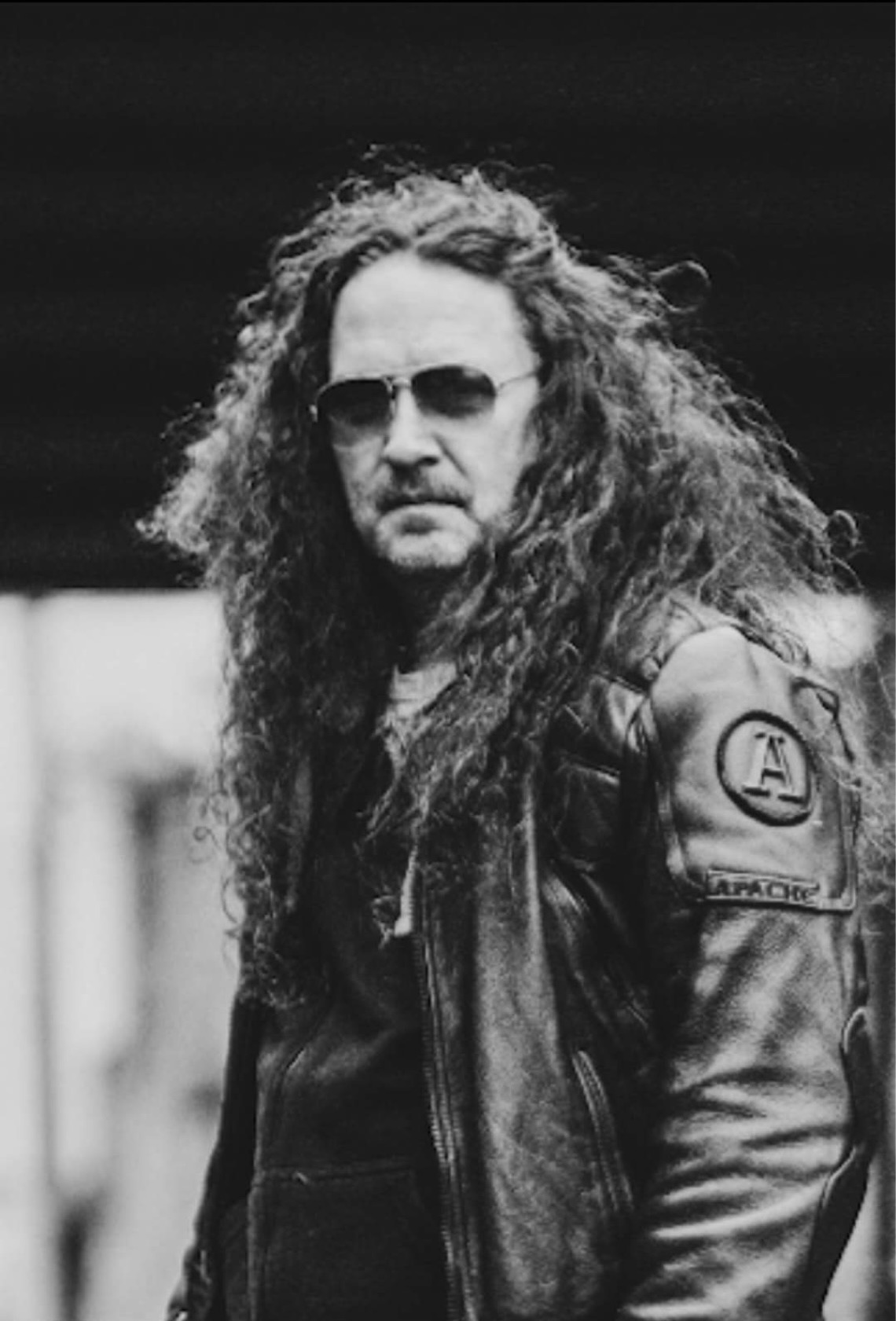
Yeah, that's a little weird. Definitely. Okay, so then you formed Abaddon the band after that, who's in that band with you?
Steve Hoggart from Aardkore on bass and vocals. His background is punk, he was in two or three punk bands. He goes back, his introduction to metal was actually Venom and Voivod but his background is absolutely punk. And Ken Johnson (guitar) was the main songwriter in a British band called Blitzkrieg and a long time ago I met Ken in a pub in Newcastle. I had seen Blitzkrieg and I said, your tone, the tone of your guitar is incredible, it's fucking brilliant. Second best I've heard to somebody like Blackmore. I just said to him, "If you have a fancy, I'm not asking you to leave Blitzkrieg but if you ever fancy being in a band give me a bell you know. I mean I've got a guitarist as it is but we could always have two guitarists."
I thought no more about it and then Abaddon was actually playing at a gig and a couple of lads who knew Ken came up to me and said, you know Ken's been sacked from Blitzkrieg after being the main songwriter for 15 years. I said, no I didn't know that and this guy said, you should give him a ring. So I did and he came in. He absolutely loves being in the band. The band's free and there's no fucking egos. Like it's my band, it's your band. Come in, bring some riffs in and you know, people are free to say I don't like that riff, come and change it a bit.
There's no egos. You can bring lyrics in and somebody can say, "Right, I can't sing that very well can I change it?" "Yeah, go for it, just do it." That's where the band is now and we're getting a great following in Europe and we just want to get some more stuff in the States and get into South America because we're playing kind of 50/50 new songs and Venom classics. We're still playing the Venom stuff as well and we've done a couple EPs, we did a couple of videos, and we've got an album ready to go.
What label is it on?
It'll be on Cherry Red.
Cherry Red? Have they been going this whole time or did somebody buy the name?
I don't know, I think they're part of BMG. Maybe they have changed hands.
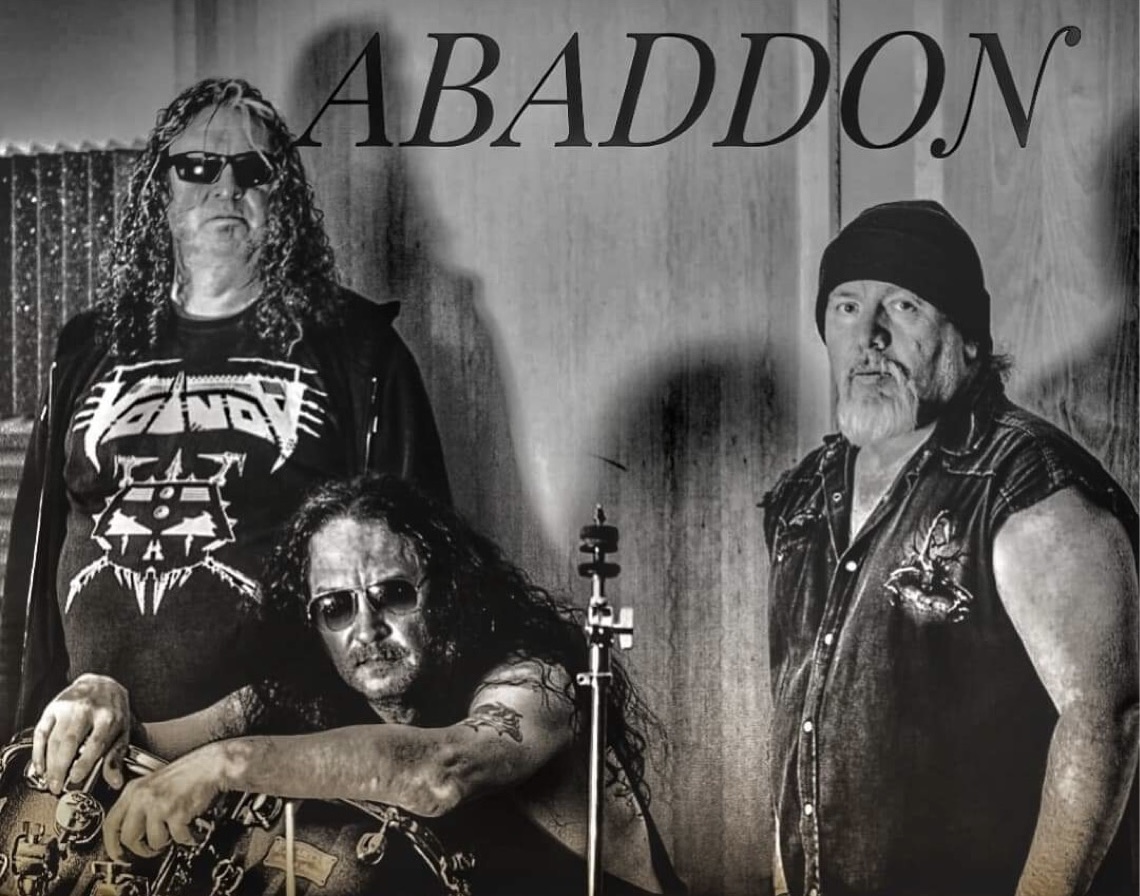
One thing I forgot to ask you just before I finish up here. Who drew the devil guy from from Black Metal?
That was Cronos. The only artwork he did was that one. It's probably the one that's most recognizable. The other artwork was all mine.
So you did the Welcome to Hell album cover and stuff?
Yeah. All the photographs for Manitou and Nightmare. Any of that sort of stuff I did, yeah.
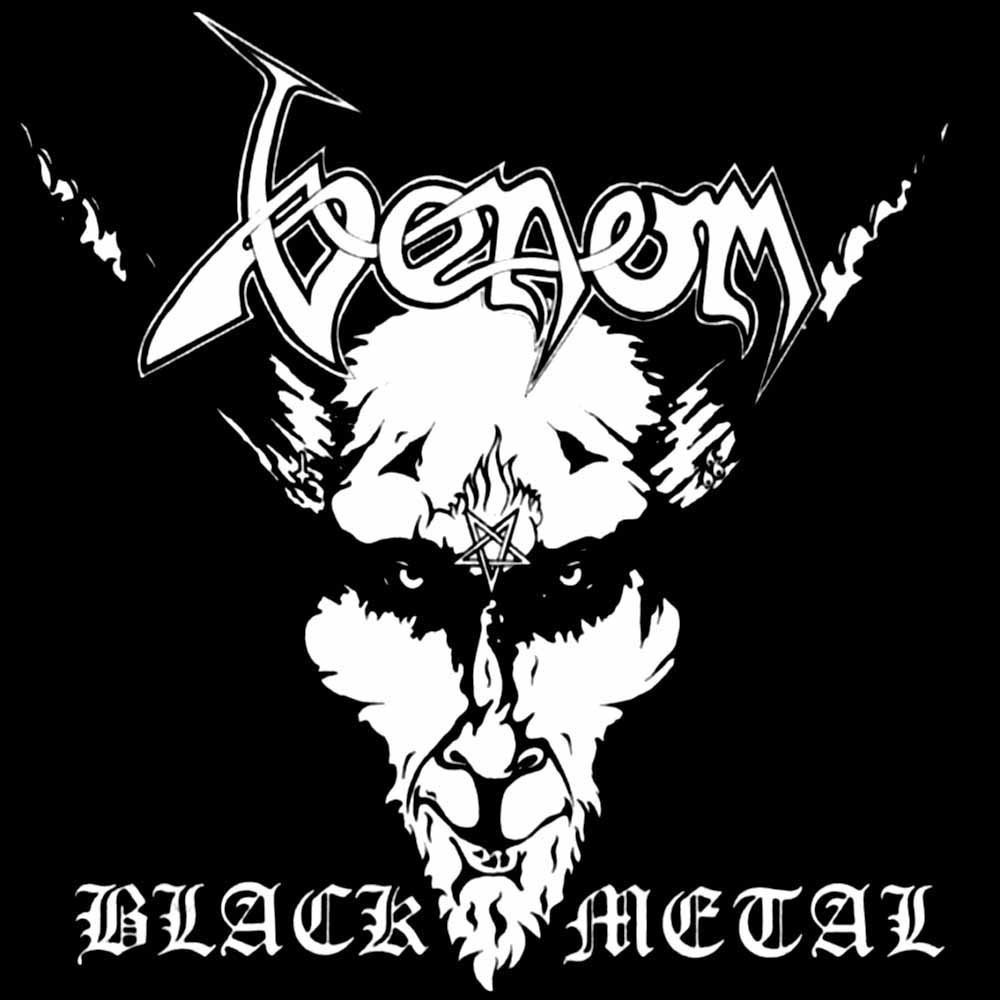
Are you still doing visual art now?
I am, yeah. I have to to get fired up to do it. But yeah whenever we've got an EP to do and we want a video for it, I'm kind of really fired into video work and I'm full of ideas. I've worked with a few different people and it's really good to keep your hand in, you know.
Okay, well, I was gonna ask you what's next for you guys but I guess we kind of already answered that. It was great talking to you man this was cool as hell. Thanks so much for doing this!
Thank you so much.
***
Help Support What No Echo Does via Patreon:
***
Tagged: a hardcore conversation, venom

